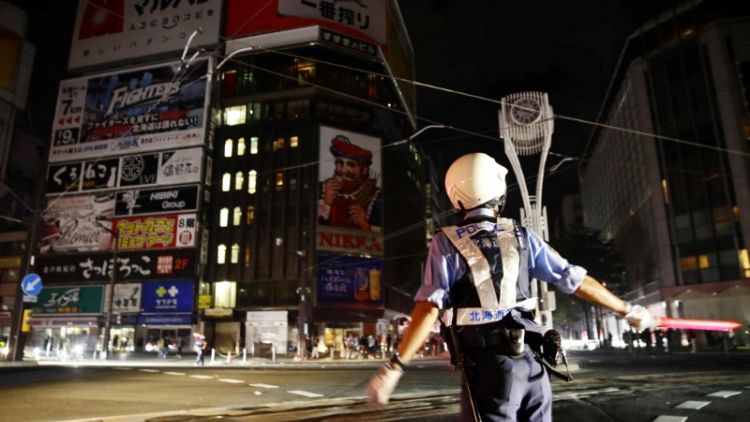By Stanley White and Leika Kihara
TOKYO (Reuters) - Japan's economy contracted in the third quarter, hit by natural disasters and a decline in exports, a worrying sign that trade protectionism is starting to take its toll on overseas demand.
The 1.2 percent annualised contraction in July-September was more than the median estimate for 1.0 percent growth in annual terms. It followed a robust 3.0 percent annualised growth in the previous quarter.
A decline in domestic demand was the biggest reason the economy shrank as strong typhoons and a powerful earthquake halted factories and stifled consumption, although economists say this disruption was temporary and the decline in exports is more worrying.
External demand - or exports minus imports - shaved 0.1 percentage point off gross domestic product. This matched the median estimate, but a breakdown of the data showed exports fell 1.8 percent quarter-on-quarter, the fastest decline in more than three years.
Japan's economy is likely to resume growth in the current quarter, but falling exports suggest this recovery could be hampered by trade protectionism, which could increase pressure on policymakers to turn to fiscal stimulus.
Cabinet Office data showed GDP fell 0.3 percent versus the previous quarter, which matched the median estimate and followed an upwardly revised 0.8 percent increase in April-June.
Private consumption, which accounts for about 60 percent of GDP, fell 0.1 percent July-September. That was less than the median estimate for a 0.2 percent decline and followed a 0.7 increase in the previous quarter.
Capital expenditure fell 0.2 percent, the first decline in two years. The median estimate was for capital expenditure to remain unchanged. Capex rose 3.1 percent in April-June.
In September a large earthquake triggered a blackout in the northern island of Hokkaido, which followed severe typhoons that damaged airports and transport infrastructure in western Japan.
Businesses were quick to resume normal operations, so the negative impact of these disasters will be short-lived, economists say.
A trade war between the United States and China, the world's two largest economies, is the bigger concern because it threatens Japan's exports of car parts, electronics, and heavy machinery, economists say.
Prime Minister Shinzo Abe on Monday ordered government ministers to compile a new public works spending package partly due to concerns about a slowdown in global demand, a common response from Liberal Democratic Party governments to downturns.
Policymakers are also worried that a nationwide sales tax hike scheduled for October next year poses another downside risk to the economy, which makes fiscal spending a more likely option to prop up growth.
(Reporting by Stanley White and Leika Kihara; editing by Eric Meijer)



